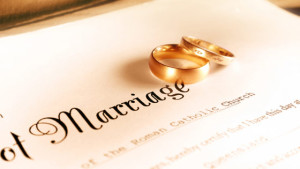
By Sarah Mac Donald - 24 March, 2015
 The Association of Catholic Priests has announced it will not be adopting any position in relation to the forthcoming referendum on redefining marriage.
The Association of Catholic Priests has announced it will not be adopting any position in relation to the forthcoming referendum on redefining marriage.
In a statement issued on Monday evening the group, which represents over 1,000 Irish priests, said it had made the decision not to come down on either side after consulting its members.
The results of the consultation indicated a wide range of views within its membership on the issue.
In their statement, the ACP appealed for “a respectful and civilised debate in which the issues involved can be discussed in a calm and reasonable manner”.
“Sexual orientation does not debar anyone from God’s love,” the ACP stated.
The group added, “If as priests we are speaking on this matter, we need to remember that the use of intemperate language can cause deep hurt among gay people and their families, as well as doing further damage to an already ailing Church.”
The Association also underlined that a particular responsibility “devolves on priests to measure their words carefully, and not to direct their parishioners to vote Yes or No”.
The priests’ group said it looked forward to a debate that will be characterised by freedom of speech and respectful listening so that the best result for the Irish people might be reached.
Separately, the lay reform group, the Association of Catholics in Ireland held an ‘Open Forum on the Family’ last weekend in Dublin.
According to Noel McCann, approximately fifty ACI members from Cork, Wexford, Sligo, Cavan, Wicklow, Northern Ireland and Dublin attended the event, described by one individual as a “real consultation on the family” expertly facilitated by Dr Margaret Nugent from NUIM.
Another delegate thanked the ACI for organising the consultation, adding that no such facility was offered in his own diocese.
The event began with four presentations on the real, lived experiences of people coping with difficult family and personal issues including marriage breakdown, living in a second relationship, coping in an inter-faith marriage and living as a gay man in the Catholic Church.
All presenters are committed Catholics living with the challenge of their particular circumstances against the back-drop of current church teaching on the family.
The second part of the day involved small group workshops on eight key issues related to the family. These included:
– Marriage breakdown, social, economic factors, pastoral issues
– The status of different ‘second relationships’ and access to the sacraments for those in ‘second relationships’
– The annulment process, options for widening and simplifying the process
– Issues surrounding co-habitation
– Humanae Vitae and family planning
– Same sex relationships, the sacraments and pastoral support
– Possible pastoral responses to the identified problems and issues impacting on the various forms of ‘family’
– Family and Faith: What support does the Family need in developing and spreading the Faith?
The group workshops were then followed by a plenary session facilitated by Margaret Nugent.
A report of the day’s proceedings is being prepared and will be forwarded to the Irish Conference of Bishops and to the Synod Secretariat in the Vatican.
Noel McCann told CatholicIreland.net that the key issues emerging at the forum include a call for meaningful representation of the lay faithful at the 2015 Synod when far reaching decisions on family life are likely to be made.
“The total exclusion of any representation of women from the Synod decision-making process is considered a fundamental weakness which will undermine the Synod outcomes,” he said.
“The Synod needs to hear ‘first hand’ the real lived experiences of people struggling with family life and avoid the adoption of rigid, dogmatic solutions which are not suited to dealing with varied and complex family problems.”
He added that this can only be achieved by providing for a meaningful lay representation at the Synod.
He said there was also a call at the forum for a review of the prohibition on artificial birth control as set out in Humanae Vitae.